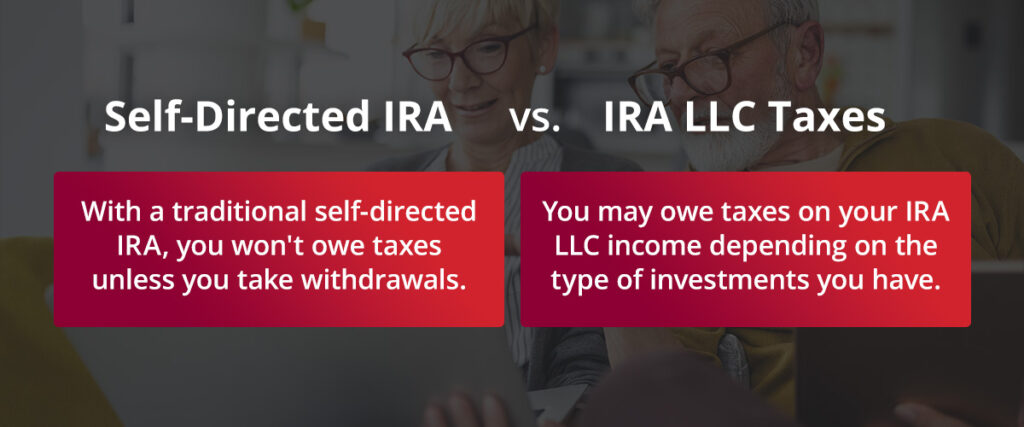
Many investors have sought alternatives to non-traditional investments to take control of their retirement. Self-directed IRAs offer investors an alternative to traditional investments, allowing them to choose from more asset categories.
There are two options for self-directed IRAs — standard self-directed IRAs and self-directed IRA LLCs with checkbook control. With both these accounts, you have control over your investments, but the type and frequency of investments will affect each differently. This article examines self-directed IRA vs. IRA LLC accounts and what to consider before choosing.
Self-Directed IRA vs. Checkbook Control IRA
Checkbook control IRAs, also called IRA LLCs, are a specific type of self-directed IRA. Knowing the difference between the two can help you plan your investments and goals. Let’s take a closer look at checkbook IRA vs. self-directed IRA accounts.
Self-Directed IRA
A self-directed IRA is also known as the custodian model. This model allows the IRA owner to invest in alternative assets in addition to traditional bonds, stocks and mutual funds. A self-directed IRA gives you access to various non-traditional assets, such as real estate, precious metals and private company stock.
Note that the Internal Revenue Code section 408 prohibits an investor from investing in insurance policies, collectibles and alcoholic beverages with an IRA.
Checkbook Control IRA
A self-directed IRA LLC with checkbook control differs from a self-directed IRA because it owns a limited liability company (LLC). The IRA owner is the managing member of the LLC and has the authority to handle the IRA funds with a business checking account, hence the term checkbook control.
The first step is to establish your LLC and open a business checking account for the company. Then, you invest your IRA in your only asset, the LLC, and make investments straight from the LLC’s checking account. Unlike with a standard self-directed IRA, you won’t need a custodian’s consent, giving you greater freedom and eliminating transaction fees and delays in processing. When you find an investment, you only need to write a check straight from your checking account.
An LLC is a valuable option if you want to invest in assets that require you to move quickly.
There are two types of LLCs — single-member and multi-member. A single-member LLC holds one set of IRA funds, meaning it contains funds from only one IRA. A single-member LLC owner can have a co-manager as long as they don’t contribute IRA funds to the LLC.
A multi-member LLC has more than one person contributing IRA funds and more than one type of IRA funds going into the LLC.
Self-Directed IRA vs. IRA LLC Taxes

Whether you need to pay taxes on an IRA depends on your account type and investments.
With a traditional self-directed IRA, you won’t owe taxes unless you take withdrawals. Because contributions are tax-free with a traditional account, you pay regular income tax on any withdrawals. Contributions to a Roth self-directed IRA are post-tax, so those withdrawals are tax-free.
You may owe taxes on your IRA LLC income depending on the type of investments you have. If you’ve invested in an asset not directly related to the purpose of the LLC, you may be subject to Unrelated Business Income Tax (UBIT). This tax applies to gross income you earn from any unrelated trade or business you regularly conduct. For example, if your IRA invests in a restaurant, you must pay tax on the business income it generates.
Another example is real estate investments. This type of investment often doesn’t require you to pay tax. However, if you purchase and sell property throughout the year, the IRS may determine these transactions indicate an active business, and you’ll have to pay UBIT. Additionally, if you use a loan to purchase property with your self-directed IRA LLC, you may owe tax on the property’s income.
Even if you do not owe any taxes, you may still need to file some forms. Organizations that make over $1,000 of unrelated business income must file Form 990-T. Multi-member LLCs are considered partnerships for federal tax purposes and must file an informational tax return using Form 1065.
A single-member LLC is not considered an entity, meaning you don’t have to file a federal income tax return for the business, though you may still need to file as an individual.
Factors to Consider Before Opening a Self-Directed IRA vs. IRA LLC
Before you decide on whether to open a self-directed IRA or an IRA LLC, consider the following:
Type of Investments
What you plan on investing in will help you make the right choice. If you want to invest in assets that require moving money quickly, an IRA LLC will help you avoid transactional delays. These assets are popular investments for self-directed IRA LLCs:
- Tax liens
- Real estate
- Real estate options
- Offshore real estate
- Investment fund investments
- Defi digital asset investments
- Cold wallet cryptocurrency investments
- Private business investments involving business management
- Investments requiring an entity, such as purchasing real estate with a loan
If you want to invest in precious metals or assets you don’t want to own, a self-directed IRA will be your best and most affordable option. Some of the typical investments for a self-directed IRA include:
- Notes
- Debt fund
- Cryptocurrency
- Precious metals
- Investment funds
- Private mortgages
- Tax lien certificates
- Private placements
- Private company stock
- Private business investments
- Real estate, including raw land
How Often Will You Invest
Investments that require frequent transactions, such as hard money loans and auctions, are best suited to a self-directed IRA LLC because you save on the transaction costs. If you are going to be active with your IRA and continuously searching for new investments, it’s wise to set up a checkbook control IRA. A standard self-directed IRA is the better option if you have passive investments that you’ll hold for an extended period.
How Much You Have to Invest
Your investment amount will also influence whether you choose a self-directed IRA or an IRA LLC. Self-directed IRAs are the more affordable option. The cost to set up each account varies from custodian to custodian, as each has its own transaction fees, wire fees and other charges. If you plan on holding a long-term investment, doing so with a self-directed IRA is more cost-effective. However, the fees can add up quickly if you have multiple assets and do frequent transitions.
Conversely, a self-directed IRA LLC is more expensive to set up, but it makes more sense for larger investments and multiple transactions since you control the funds directly and don’t need to pay transaction fees.
Open an Account With Accuplan
Self-directed IRAs, including IRA LLCs, allow you to invest in alternative assets and have greater control over your funds. Accuplan is a leading provider of self-directed IRAs. Our expert team has years of experience in IRAs, helping set clients up for investment success and delivering the best service. We work with countless investors with different goals and needs, enabling us to provide a state-of-the-art product to you. Are you ready to plan for your retirement? Open an account with us today!
Our information shouldn’t be relied upon for investment advice but simply for information and educational purposes only. It is not intended to provide, nor should it be relied upon for accounting, legal, tax or investment advice.
